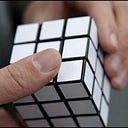9 #LifeHacks: Smartphone habits, using Outlook as a to-do list, and quicker coffees
Efficiency is an Art form that I have pursued for much of my life, possibly (OK, probably) much to the annoyance of my friends, family, or coworkers. It could be because my first 10 years were influenced by practical, ‘do it right or not at all’ Midwesterners in my home state of Michigan — which in the 1970s was full of people with Nordic, Germanic, and Slavic surnames indicating recent immigrant families who likely had a no-frills approach to life (as immigrants often do, by necessity). Or it could be just that I have an Obsessive-Compulsive tendency toward counting, categorizing, comparison/contrast, and other types of analysis.
When I moved in 2014 to Munich, Germany, I was immediately fascinated to be living among what I had always assumed were the ‘most efficient people in the world’. After about a year, however, I realized that Germans are naturally efficient regarding manufacturing and logistics (i.e. things that get optimized very slowly over time) but not much else (they love meetings and documentation far too much to be very efficient in other areas). I’ve a theory that this is in large part due to the language itself shaping the way in which they view the world (it’s certainly a language that lends itself well to the often over-analytical pursuit of philosophy), but that’s a topic for a different day.
The result after 3.5 years in Germany is that I no longer feel like Germans have an advantage regarding efficiency. In fact, even if you’ve gone your whole life feeling like you are incredibly inefficient, the good news is that you can learn the Art of Efficiency without much difficulty.
The following tips are basically just observations about ways in which I’ve noticed myself becoming more efficient over time.
5 LifeHacks/WorkHacks for using your smartphone and not the other way around (i.e. your smartphone using you):
1. Turn off all notifications except for those that are necessary for your income. I get notifications only for phone calls, work emails, and chat apps that are connecting me to my work colleagues. Even then, I keep my phone on silent about 95% of the time and check for notifications on my own time — when I want to — rather than having my time controlled by the technology.
2. Any apps that you need but which excessively consume your time, place in a folder — out of sight, out of mind. You will quickly notice how much more efficient that you are with your time, and you won’t get sidetracked so easily when, for example opening your screen to type a note into Evernote… and then thinking you can quickly check your social media accounts first (forgetting about the gem that you wanted to save to Evernote in the first place).
3. Stick to maximum 3 home screens — so you can easily swipe once either left or right — and put your most-used apps in the middle screen. Keep the number of apps fairly balanced between all 3 screens, and if any one screen gets more than half to 2/3 full, think of folders you can make to organize by type (e.g. SOCIAL, GAMES, SOUNDS, TO READ, etc.).
4. Use web versions of your smartphone apps when at a PC. For example: https://web.whatsapp.com/ and https://web.telegram.org/ are much faster for replying than picking up your phone and using your thumbs. You can also find Chrome or Firefox plugins or Windows app versions for a lot of other apps that you might associate with your smartphone alone: Evernote, Pocket, Dropbox, etc.
5. Now one tip that goes against the first four, as this one will push you to use your phone more (and the others did the opposite, in case you weren’t paying attention). In case you cannot sleep, it’s often good to get out of bed for a while and make or read something. I would however narrow the scope of activities to encompass pushing yourself to be better somehow. Open your phone guilt-free and focus your attention on optimizing your LinkedIn profile, reading professional articles for work, or making notes for what you want to accomplish the next few days (this stuff can put me to sleep like reading a university economics textbook or a collection of psychiatry patient studies). If you know you’re going to be tired the next day, then at least feel better knowing that you did or learned something with the sleep time that you sacrificed.
3 LifeHacks/WorkHacks for using Outlook to get more done in your short time on Planet Earth:
1. Use Outlook as your to-do list. That’s it, it’s really that simple. Enter tasks as “New Appointment” (rather than “New Meeting”) and simply drag and drop them — or expand/contract them — as needed, to prevent others from plugging unwanted meetings into your work time. The first few years that I used Outlook, I was not aware of the drag and drop feature, and I thought that one had to click open the event and adjust the day and time manually to change something… until one day I noticed that a colleague was easily moving things around to fit her agenda for the week. Bingo. Time saved.
2. Keep everything, flag items that you want to return to, and go back through your list of flagged emails (they show up as “Tasks” after you flag them) about once per week. If it’s something super-important, go ahead and put it into your calendar (see number 1 above). The reason to keep everything is that sometimes even a couple years later you might need to find some old email conversation to share with a new colleague who was not yet working there at the time (e.g. for a company logo legal issue, which would not change very often).
3. Block all your Friday afternoons. A former manager of mine did this for our team (I have since done it for my team here at MyQ Solution, as well) because his experience was that it gave people a chance to catch up with work, plan ahead for the coming week, and clear the head a bit… leading to a Monday renaissance that is far more productive. For our team, I called it “MKT Weekend Prep” and we will use this time for the above reasons and/or for personal development and training.
1 (BONUS) LifeHack/WorkHack for saving time getting coffee:
If you find yourself at least halfway between your desk and the coffeemaker or even closer (to the coffeemaker), forget the cup that you’re already using that you’ve left behind on your desk. Get another cup from the kitchen. At the end of the day, on your way out from the office, bring all the dirty cups from your desk to the kitchen in one load. I know this may sound weird, but seriously I am A/B or A/B/C testing these sorts of things daily.
*
One final note: You can find various ways to save time in your day literally anywhere and everywhere. I’ve noticed others like me when riding a bus, tram, or train, making our way to one end or the other during transit — to already be at the doors closest to our destination when we finally stop. For me these extra seconds shaved off here and there equate to more time with my family — and that’s all the reason I need to practice the Art of Efficiency.
Please feel free to share some of your own tips/tricks for saving time. I am always open to trying and analyzing new approaches. Thanks!

